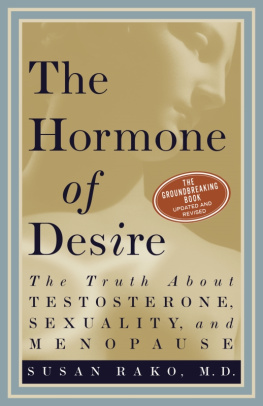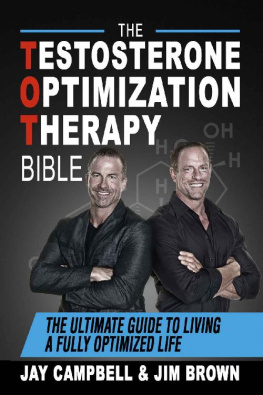DISCLAIMER
The ideas and advice in this book are based upon the experience and training of the author and the scientific information currently available. The suggestions in this book are definitely not meant to be a substitute for careful medical evaluation and treatment by a qualified, licensed health professional. The author and publisher do not recommend changing medication or adding hormones without consulting your personal physician. They specifically disclaim any liability arising directly or indirectly from the use of this book.
Copyright 1998 by Eugene Shippen, M.D., and William Fryer
All rights reserved. No part of this book may be reproduced or transmitted in any form or by any means without the written permission of the publisher.
M. Evans and Company, Inc.
216 East 49th Street
New York, New York 10017
Library of Congress Cataloging-in-Publication Data
Shippen, Eugene.
The testosterone syndrome : the critical factor for energy, health, and sexualityreversing the male menopause / Eugene Shippen and William Fryer.
p. cm.
Includes index.
ISBN 0-87131-829-6 (cloth) ISBN 978-0-8713-1858-9
1. TesosteroneTherapeutic use. 2. Climacteric, MaleHormone therapy. I. Fryer, William, 1949- . II. Title.
| RC884.S55 1998 |
| 615.366dc21 | 97-43349 |
DESIGN AND TYPESETTING BY RIK LAIN SCHELL
Manufactured in the United States of America
9 8 7 6
Contents
Preface
If I told you that one key substance in the body is more powerful than any other health factor, is more closely linked to risk of illness if and when a deficiency occurs, is more misunderstood, more improperly used, and more tragically underused than any other, what would it be? Testosterone! I have studied it, prescribed it, and watched the responses of my patientshundreds of them. I challenge anyone to find a more diversely positive factor in mens health. When normally abundant, it is at the core of energy, strength, stamina, and sexuality. When deficient, it is at the core of disease and early demise.
Testosterone deficiency has been an unrecognized syndrome that impacts every sinew and cell in the body. It is powerfully linked to nearly every major degenerative disease. Use of this remarkable healing hormone could reverse suffering and prevent early death. My research uncovered a mountain of medical literature that has been basically ignored supporting its benefits.
I was taught that there was no male menopause and for years accepted that as fact. A series of events in my own health and the discovery that several pioneering physicians held entirely differing points of view changed my mind and transformed my conception of age-related illness and preventive medicine. Until that point, I had seen aging as an unrelenting natural process that it was best to accept gracefully. Preventive medicine was an attempt to treat or modify specific risk factors that, like a sleeping lion, would jump up and bite you later in life.
My perspective changed dramatically. Clearly, preventive medicine would widen in scope if it turned out aging was reversible. And, to a significant extent, it is. The male menopause, a grim milestone in the middle passage of a mans life, can be rolled back.
Testosterone decline is at the core of that male menopause (and a key element in the female menopause as well). Naturally, the two sexes have a different experience of midlife menopausal change. In women, there is an explosion of in-your-face symptoms, while mens very similar symptoms sneak in the back door unexpectedly like a thief in the night. Too often, loss of energy, ambition, sexual drive, and a host of minor symptoms are written off as burnout or depression.
Women, meanwhile, have already learned that hormone replacement results in reversal of the physical changes of menopause. Men, confronted by an information vacuum, still need to make the same discovery.
There are, of course, scientists on both sides of the fence. Even after forty years of experience, few subjects engender more emotion and controversy than estrogen replacement for women. Yet the vast majority of studies show a risk-benefit ratio that emphatically favors the camp of hormonal replacement. The considerable literature on testosterone replacement shows a very similar balance of benefit over risk. Keep that in mind and remember that quality of life is clearly the cornerstone of all treatment decisions.
Why have the subject of male menopause and the advantages of testosterone therapy taken so long to surface? One can only speculate. Perhaps the unspeakable spectre of impotence is at the root of silence. Perhaps it simply takes time for new ideas to rise into the medical mainstream. Old dogmas and clinical habits die hard. It is well for us not to rashly assume that every new nostrum has value, but resistence in the face of overwhelming science has no excuse. To prevent the suffering of many is, for me, a powerful motivator. That is why I wrote this book.
Resistance will fade. Testosterone therapy has every prospect of becoming for men what estrogen therapy is now for millions of women. The male menopause, a real tragedy in the midlife of the average man, has had its day. I am going to put a stake through its ugly little heart. I promise.
Eugene R. Shippen, M.D.
CHAPTER 1:
A Menopause for Men
A menopause for men? Youd better believe it. Men are in no way immune to midlife changes. They, too, suffer those transforming physical experiences thatwhen we see them in womenwe call, with definitive finality, the change of life. Its the big changethe one that means youre no longer young.
Of course, we all change constantly as the years tick by. We get used to it. The alterations in our physical identity seem familiar, expected, even comfortable. But then suddenly, at some point in our lives, we are genuinely startled. Changes occur that we hadnt bargained for. Aging no longer looks benign. Pain, weariness, the fraying of desire, the dark shadow of depressionall proclaim that a toll is being taken on our bodies and our spirits. By and large, the toll gates of change are hormonal. For some, the price of entry will be very high indeed.
Surely it makes sense to ask whether we cant reverse some part of this process of aging. Would it surprise you to know we can?
Allow me to define a word, without which the rest of this book is meaningless. Hormone. A hormone is a chemical substance produced in one part or organ of the body that starts or runs the activity of an organ or a group of cells in another part of the body. Testosterone, estrogen, insulin, adrenalin, cortisonethese are a few of the hormones found in most peoples vocabularies and at least vaguely understood. Hormones can also be converted from one hormonal substance into another out in the tissues of the body. This is a newer concept, which later in the book will prove vital, and it is referred to as intracrinology.
In the last few years, the popular anti-aging literature has given many people a familiarity with such hormones as DHEA, growth hormone, and melatonin. They are genuinely important substances, and perhaps some of you are already familiar with the idea that the levels of hormones can affect our actual (as opposed to chronological) rate of aging.





